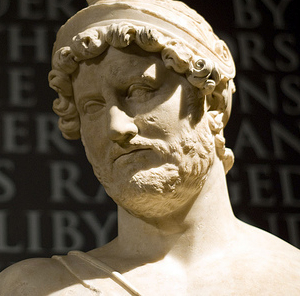Hadrian had a tough act to follow, but he did hit the ground running. His only problem was that Trajan had never actually nominated him as his successor until he was on his deathbed – and even this was only witnessed by Plotina his pro-Hadrian widow.
There was a risk that some highly placed senators might dispute his succession. But Hadrian had one extremely good card in his hand. At the time of Trajan’s death he was in active command of the legions putting down a revolt in Judea. Armed force was always the important consideration in Roman politics. He also had reliable allies in Rome, notably Attianus, who was able to formulate an effective strategy against the prominent senators best placed to form an anti-Hadrian faction. This strategy consisted of accusing them of treason and killing them without a trial. This seemed to do the trick. Hadrian was able to start his reign unopposed – and in fact there was never to be any challenge to him.
Hadrian’s reign was to be much more peaceful than Trajan’s. This was clearly a conscious decision on the part of Hadrian. As it was never put to the test, we will never know how Hadrian would have shaped up as a war leader – but he was a good enough general to command the respect of Trajan. It seems likely that he would have been extremely effective, but he clearly wanted to behave defensively rather than aggressively. His energies were directed towards building walls and improving communications to make the empire more secure rather than extending its power further. Hadrian’s famous wall in the north of Britain was one example of this. Withdrawing from Trajan’s conquests in Mesopotamia to more easily defended borders was another. He also built strong defensive positions along the Rhine and the Danube.
A strong leader using his military power to ensure that his people have peace is very appealing to the modern mind. I have a feeling that Hadrian would be more popular than Trajan nowadays. The lack of any opposition to Hadrian in his long reign shows that the Romans of his own day were not too unhappy with him, but it is clear that Trajan’s more aggressive approach was more to contempary tastes. But Hadrian was more than a military strongman with a pacifist tendency. He traveled continually throughout his empire and tried out various initiatives. At one stage, motivated by his love of Greek culture, he tried to create a Greek parliament. The Greeks didn’t live up to Hadrian’s enthusiasm for them, and the whole thing fell apart. But even so, it is amazing the kinds of projects you can take on when you are the absolute ruler of the known world. A less well known deed was consecrating a temple in York to a new goddess called Britannia that he had admitted to the Roman pantheon. Britannia was to be resurrected many centuries later by the Victorians as a symbol of their own empire.
As to his character as a man he was a bit of a mixture. He was certainly ruthless. As we have seen his first act on coming to power was to kill off the key rivals who might have made his life difficult. He was also vigorous, spending almost his entire reign on the move and visiting every province. His decision to pull back from Trajan’s recent acquisitions probably showed a realistic strategic sense. His preparations made sure the empire was well defended. But he wasn’t obsessed by warfare like his predecessor. He was keen on the arts, and even wrote poetry in both Greek and Latin – some of which has survived. The idea of a major political figure writing poetry and making it public strikes me as a bit quaint. It might well have been bemusing at the time too. But of course you wouldn’t have been able to laugh out loud about it. A poet who has the power of life and death can’t be particularly conducive to literary criticism. He was also enthusiastic about architecture. He drew up his own plans for buildings, though his efforts failed to impress proper architects. Gibbon describes him as ‘an excellent prince, a ridiculous sophist and a jealous tyrant’. He wouldn’t have been able to say that to his face of course. Hadrian followed Trajan’s example of ensuring an orderly succession. In fact he nominated not only his successor but his successor’s successor. Planning this far ahead doesn’t often work out but Hadrian’s nominees went on to rule for a further 40 largely trouble free years. Antoninus Pius was adopted as Hadrian’s son on condition that he in turn adopted the young but promising Marcus Aurelius as son and successor. This effectively opened up the prospect of preventing any vacancy in the throne for many decades to come.
Antoninus came to power at the age of 53 and was widely acknowledged almost from the start as a wise and benevolent emperor. He was happily married to a beautiful woman called Faustina whose charity had made her popular in her own lifetime and who Antoninus deified after her death. As far as we can tell, he was popular with everyone except possibly historians. Gibbon complained that his reign left little to write about. Like Hadrian’s – the reign of Antoninus Pius was a peaceful one. Not only did he never lead a Roman army to war – he seems never to have even left the capital. He inherited a ready made successor in the shape of Marcus Aurelius, who had attracted the attention of Hadrian at an early age. On his death, Marcus duly succeeded.
Read the next instalment of this extended review of Gibbon’s Decline and Fall of the Roman Empire: Marcus Aurelius
Thanks to fras1977 on Flickr for the photo of Hadrian on the podcast link.

